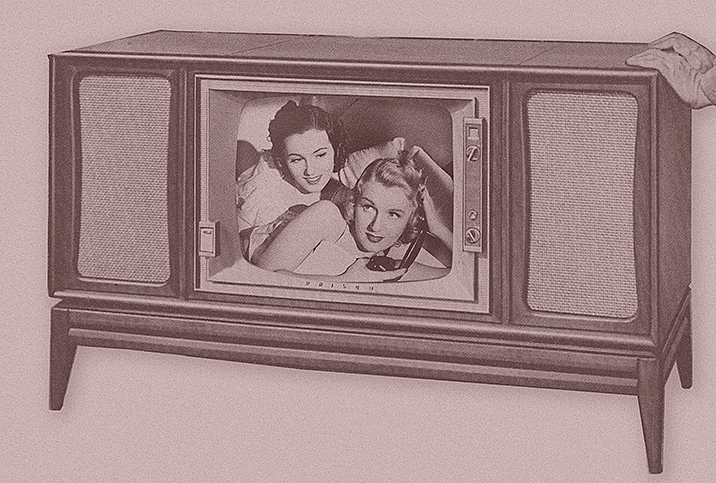Heteronormative Coming-of-Age Films Are Queerer Than You Might Think

As a teenager, I used coming-of-age films as a method of escapism. To this day, as a 24-year-old, I still romanticize my life with film soundtracks that give me major main-character energy. I still feel that special sense of escapism—that youthful feeling—when I turn on my old favorites. These films make anything feel possible, even when you're no longer at the cusp of the endless possibility that youth dictates.
Film studies typically interpret coming-of-age stories as a genre that focuses on the transition of a protagonist from childhood to adulthood. Coming of age is celebrated by myriad cultures, from the Jewish bar and bat mitzvah to the Latin American quinceañera. A pivotal moment, the transition from childhood to adulthood denotes a sense of maturity or a discovery of a critical aspect of identity, sometimes including sex and intimacy. From first kisses to first sexual experiences, film helped me to explore my sexuality as a queer, closeted teen when I didn't know who I was or where to turn.
The super-hetero coming-of-age film
Like much of the Tumblr generation, I adored "The Perks of Being a Wallflower," absorbing the book as quickly as I fell in love with the film adaptation. However, returning to this film in recent months, I realized the reason I loved it so much wasn't just because it made me feel endlessly hopeful, but because it allowed me to explore the love for women I hadn't quite dissected yet. I recognized my attraction to girls at school, with my crushes disguised as a longing to either be the ones I fancied or to be liked by them, but I didn't identify my own bisexuality until I was 17.
The 2012 film stars Emma Watson, with a cute, cropped hairdo, as the endlessly cool Sam. I loved watching Charlie fall for her. Films like these allowed me to mirror the experiences I wished I had with the girls at school: Sam has a boyfriend throughout the film, and eventually, she and Charlie kiss. The appeal wasn't necessarily Watson's portrayal of the character, but the character the film projected: Coming-of-age films explore the softness of emotional connection as much as they do physical attraction, and it was Sam's character I fell in love with. Her softness, her kindness, her smile.
I felt the same watching "Submarine," a 2010 film starring Craig Roberts and Yasmin Paige. Again, this film follows a similar trajectory, with a nerdy teenage boy falling in love with an alluring female character. With her heart-shaped sunglasses and awkwardly cropped hair, Jordana is the epitome of cool. She is everything I wanted to be when I was a teenager, which I later realized came from a place of lust.
It wasn't until "Booksmart" was released in 2019 that I realized the hold these heteronormative films had on me growing up. The film follows the story of Molly and Amy, two nerdy high school girls hell-bent on graduating with straight A's. Amy, played by Kaitlyn Dever, identifies as gay. From the beginning, this is introduced to us as a very natural thing; it isn't overtly signaled and it isn't her only personality trait. She has a crush on a girl who has a boyfriend, but by the end, she finds love in the mean girl in the classroom who used to tease her for being too nerdy.
Watching this in the cinema, I realized I'd been deprived of queer coming-of-age content growing up, but the heteronormative storylines I did see had informed my sexuality nonetheless. I'd constantly used these stories to mirror the experiences I wished I was having—as a home for the feelings I had for girls but couldn't yet share with the world.
I'm not alone
Rachel Worthington, a sex expert, writer and educator at BedBible based in Denmark, grew up queer and experienced much of what I did.
"Film can be a powerful tool to tell people's stories and encourage thoughts and discussion, and can contribute to a wider cultural consciousness of a range of sexualities," she said. "While someone may not consciously identify with someone in a coming-of-age film in the way that it makes them realize something profound about their sexuality, they may still identify in smaller ways with feelings and situations that are portrayed in these movies."
She, too, has noticed a shift in recent years from projecting queer feelings onto film to seeing them overtly.
"It's only in recent years that a larger variety of stories about queer people are being told," Worthington said. "For those of us who weren't lucky enough to experience those, the messages and experiences of these films may well have passed us by simply because they weren't relatable enough."
At 19, Worthington discovered she was bisexual. She explained that film and TV allowed her to explore her sexuality in a way she hadn't been able to before. She was exposed to a greater diversity of content, often more explicit than what she was used to, which helped her realize her love of and attraction to all genders.
'Film can be a powerful tool to tell people's stories and encourage thoughts and discussion, and can contribute to a wider cultural consciousness of a range of sexualities.'
"Watching people around my age who were exploring their sexuality in physical ways was a real eye-opener for me," Worthington said. "As someone who doesn't experience a whole lot of attraction towards strangers in general, I had taken my lack of interest in random women to mean I wasn't into them. But once I saw what could happen between two women who were into each other, that slowly started to change."
Ness Cooper, a clinical sexologist and trained youth sex educator in the United Kingdom, explained that coming-of-age films hold special meaning and evoke nostalgic feelings because they mark and reflect on milestones deemed to be culturally important for young people.
"Not only do coming-of-age films add reassurance to youths' thoughts and feelings around their body, sexuality and even gender, they can also give individuals the permission they need to explore these areas. Coming-of-age films can also act as indirect self-help guides when it comes to navigating first-time moments in relationships," Cooper explained.
To this day, I still love watching coming-of-age films. Though I'm now out as bisexual, I'm still drawn to the nerdy, heteronormative love stories that arise in the school corridors; the Charlie and Sams and the Oliver and Jordanas of the film world. There's something to be said for the coming-of-age films that allowed us, closeted queer kids, to feel something and imagine a future where we could kiss the characters we lusted after.


















Commentary